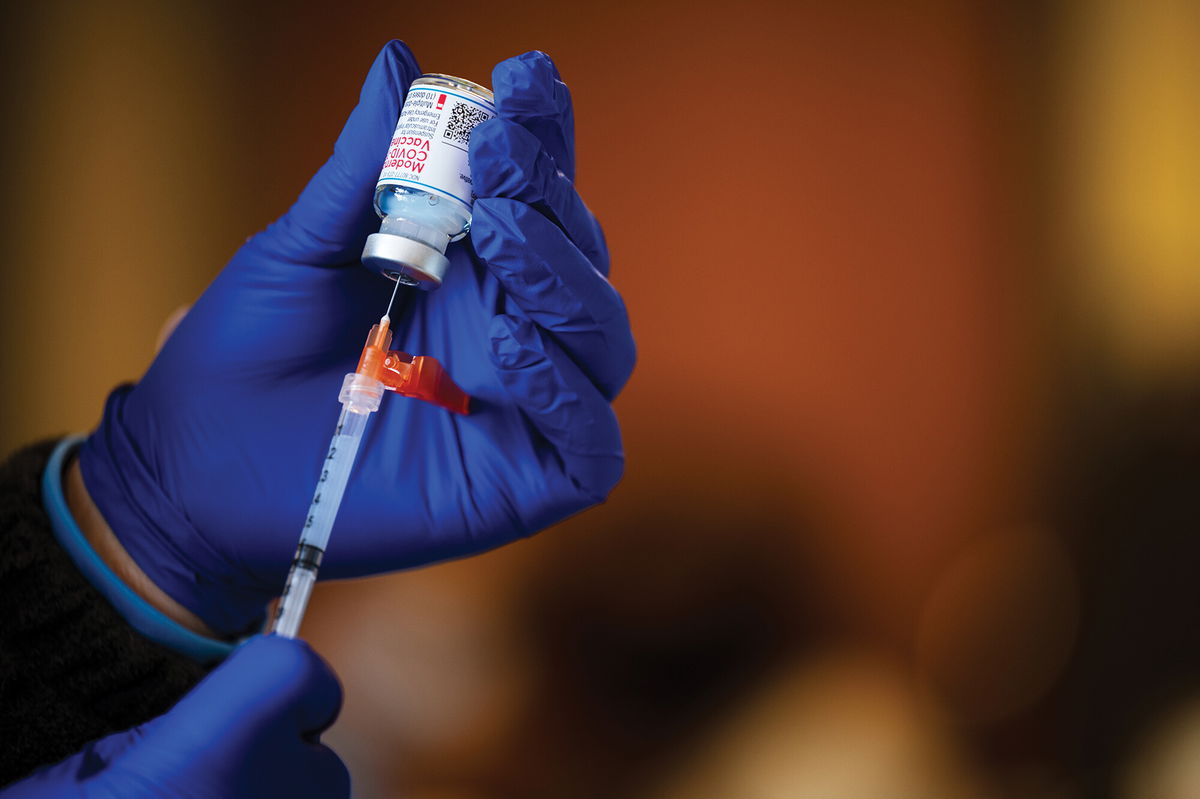Moderna begins next phase of Omicron-specific booster trial as study finds that antibodies remain durable despite 6-fold drop over 6 months

A medical technician fills a syringe from a vial of the Moderna COVID-19 vaccine in Bates Memorial Baptist Church February 12
By Jen Christensen, CNN
Moderna announced Wednesday that the first participant has been dosed in the company’s Phase 2 clinical trial of a coronavirus vaccine booster shot that is specific to the Omicron variant.
Moderna is advancing the trial into its next phase as research published Wednesday in the New England Journal of Medicine found that a booster dose of the vaccine remained durable against the Omicron variant but did show signs of waning antibody protection.
“We are reassured by the antibody persistence against Omicron at six months after the currently authorized 50 μg booster of mRNA-1273. Nonetheless, given the long-term threat demonstrated by Omicron’s immune escape, we are advancing our Omicron-specific variant vaccine booster candidate and we are pleased to begin this part of our Phase 2 study,” CEO Stéphane Bancel said in a news release. “We are also evaluating whether to include this Omicron-specific candidate in our multivalent booster program.”
Moderna said it expects to enroll about 600 people in the study, which will take place at up to 24 sites in the US. Some participants will have already received two doses of Moderna’s vaccine, and some will have received a booster shot.
Moderna promises to share its data from the trial with public health leaders so they can make evidence-based decisions on the best booster strategy against the coronavirus going forward.
Pfizer and BioNTech, makers of the other major mRNA Covid-19 vaccine, announced Tuesday that they had begun their own Omicron-specific vaccine trials.
Omicron currently accounts for 99.9% of US Covid-19 infections, the US Centers for Disease Control and Prevention said Tuesday. The Delta variant makes up the remaining 0.1%.
The new study says the Moderna Covid-19 booster shot remains durable against the Omicron variant, but the antibody protection wanes and is six times lower six months after getting boosted.
The study also found that the neutralizing antibody levels declined against the Omicron variant much more rapidly than against the dominant strain of the virus that was circulating two years ago.
Research teams from Moderna, Duke University, Emory University, the Fred Hutchinson Cancer Research Center, the Baylor College of Medicine, the University of Maryland School of Medicine and the National Institutes of Health looked at blood samples of people who had received Moderna’s Covid-19 vaccine.
Two doses of the vaccine elicited detectable neutralizing antibodies against the Omicron variant in 85% of the people one month after the second dose, but after seven months, neutralization of the variant was detected in only 55% of people.
Getting a third booster dose of 50 micrograms (μg) of vaccine resulted in a 20-fold rise in Omicron neutralization levels within four weeks after the boost was administered, but after six months, those levels fell 6.3-fold. By comparison, the durability of neutralization against the ancestral strain of the coronavirus fell only 2.3-fold after six months.
“While the antibody levels in study participants who received the boost continued to offer strong neutralizing activity, the levels of these antibodies declined faster for Omicron than for the early SARS-CoV-2 virus that was circulating two years ago,” the researchers said in a news release.
The study had a few limitations. It included a small sample size, so it may not completely reflect how well the vaccine neutralizes the virus in diverse populations or in varying lengths of time before a person gets a booster.
These were also not real-life studies, and scientists looked only at antibodies generated in blood. Studies indicate that levels of antibodies correlate with real-world protection, however.
Dave Montefiori, a co-author of the study and a professor in Duke University’s Department of Surgery, said the drop in antibodies for the booster is very similar to the drop in antibodies to the Delta variant that was noted six months after the second dose of vaccine, which prompted the advent of booster doses.
“This is not uncommon, for mRNA vaccines or for vaccines in general,” Montefiori said. “Antibodies go down because the body figures it does not need to maintain them at that high level. It doesn’t mean there is no protection. There is immunologic memory.”
Montefiori said that the concern is that the virus might change enough that the vaccine needs to be modified, and he noted Moderna’s Omicron-specific booster trial.
But for now, he said, the data is not there yet, and the vaccines “are still working, and the boost is helping it to work better, even against Omicron.”
Dr. William Schaffner, medical director of the National Foundation for Infectious Diseases and a professor of medicine at Vanderbilt University, was cautiously optimistic about the findings. “The good news is that Moderna, when boosted, will give very high levels of antibodies, and of course, that’s very encouraging,” said Schaffner, who was not involved in the new study. “But as we’ve learned with these Covid viruses, the antibody levels begin after a period of about six months to decline.”
We’ve seen it before, Schaffner said, but we don’t exactly know how this translates into real-world performance. “It’s not clear whether this translates into reduced protection particularly for severe disease,” he said.
Large population data shows that two doses of the vaccine plus a booster provides rigorous protection against severe disease, even against the Omicron variant.
“I think this study reinforces that basically, what was seen with the Pfizer vaccine plus boosting is replicated with Moderna also, and it may also be a harbinger or an early sign that at some interval down the road, as we get over this pandemic and get to a truce with this virus, that we may well have to get a periodic booster in order to maintain protection.”
The-CNN-Wire
™ & © 2022 Cable News Network, Inc., a WarnerMedia Company. All rights reserved.